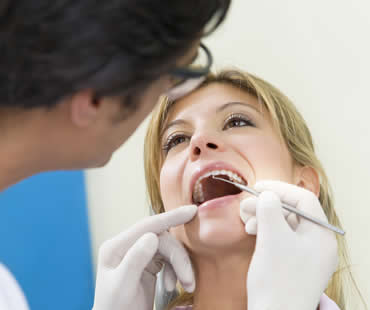
Brush and brush and brush, but you probably will not be able to get rid of all the plaque on your teeth. Even with regular brushing, some amount of plaque will build up on your teeth and turn into a hard substance called tartar. It simply can’t be removed without professional help.
What is tartar?
Tartar is a hard, yellow or brown deposit that forms on your teeth both above and below your gum line. Any food particles remaining in your mouth after eating will breed bacteria, which creates a thin film on your teeth called plaque. Any plaque that isn’t removed with brushing and flossing will harden to create tartar.
Is it harmful?
Tartar makes the surface of your teeth rough, which attracts food particles and therefore accelerates tartar formation. If you allow tartar to continue building up, your teeth will become discolored and your gums will be at risk. You will likely develop gingivitis, in which your gums become swollen and red. They will bleed easily and become painful, and eventually can lead to tooth loss. Advanced gum disease is even linked to higher risks of stroke, heart attack, and lung disease.
How is it removed?
Tartar is too hard and stubborn to be removed with regular brushing. The only effective way to eliminate tartar is by visiting your dentist and having it removed using professional equipment. This procedure is commonly called scaling.
Can I prevent tartar buildup?
Regular brushing at least twice daily with a fluoride toothpaste can help reduce tartar formation. Unfortunately, even with proper dental hygiene, plaque buildup is inevitable over time and will become tartar. Schedule regular checkups with your dentist to have professional cleanings performed.
If you live in the Meriden area contact us today

The fact is that the health care provider most people should see the most is their general dentist. Because this branch of healthcare is uniquely targeted at preventing disease and promoting good hygiene, general dentistry can help you avoid oral concerns and maintain a healthy and attractive smile.
General dentists are the most common providers for dental treatment for patients of all ages. Routine dental visits involve examinations, sometimes diagnostic tests, professional cleanings, and discussions about concerns. If your checkup reveals issues that require further treatment, most general dentists perform required procedures. However, your general dentist may refer you to a specialist for complex treatments.
What does a general dentist do? Differing from specialists who focus on a certain area of oral care, general dentists offer a wide variety of services.
- Preventive services – The goal of preventive dentistry is to stop disease before it has a chance to progress. Regular exams, diagnostic images, and professional cleanings are part of prevention. Proper oral hygiene techniques will also be discussed.
- Restorative services – Procedures for dental problems falls into this category, including fillings, crowns, gum disease remedies, dentures and more. Some general dentists also offer specialized treatments like root canal therapy and dental implants.
- Overall oral health services – Some dental problems are reflected in overall health concerns. Diabetes, cardiovascular disease, pregnancy complications and other problems may arise. General dentists can identify issues like these and offer treatment or direct you to the right specialist.
- Cosmetic services – Many general dentists offer cosmetic treatments such as dental veneers, teeth whitening, bonding, orthodontics and more.
When should you visit your general dentist? Experts recommend getting checkups every six months, or more often if you have an issue that should be addressed like a toothache or gum bleeding. Cosmetic appointments can be made at any time. The main thing is seeing your general dentist regularly so you can benefit from preventive care.
If you live in the Meriden area contact us today

Most dentists recommend that patients replace their toothbrushes every three to four months. About this time, the bristles start to wear out or become frayed, which makes the tool less effective. You should also replace your toothbrush right away if you have been sick so that you don’t re-infect yourself.
Once you are done with the toothbrush, you don’t have to immediately toss it in the trash. These creative opportunities will allow you to put that old toothbrush to good use.
Dust the keyboard
The precision of the bristles makes it a cinch to get between the keys.
Eliminate stains
If you get spots on your carpet or upholstery, an old toothbrush will enable you to really scrub the soiled area and remove the stain.
Touch up your roots
For those who dye their own hair, an old toothbrush is the perfect tool for applying color to specific areas.
Dislodge dirt from under your nails
Gardening will help your plants grow, but will also make your manicure look less than appealing. With an old toothbrush, you can say good-bye to grimy nails.
Polish jewelry
To make your favorite pieces sparkle, use an old toothbrush and a tab of toothpaste to restore their beauty.
Clean bike chains
If you don’t want to look like a mechanic after taking grease off the chains, you can grab an old toothbrush and easily finish the job.
Remove silk strings off ears of corn
Before boiling corn, wipe the ears with an old toothbrush to eliminate the corn silk and keep it out of your teeth.
Schedule your appointment at our Meriden dental office

Did you know that it takes fewer muscles to smile than frown? This powerful tool often gets lost in the busyness of our lives. Not only is smiling easier on your face, but it can significantly improve your mood and give somebody else’s day a lift. The benefits of smiling include:
Connects you with other people
When you share a smile with another person, you form an instant bond. By boosting that individual’s mood, you can reduce stress levels and possibly encourage that person to try on a smile. Actually, you can use a smile as currency to successfully navigate awkward social situations and gather any assistance you need.
Changes your perspective
If you feel anger or stress, smiling can give your attitude a much-needed adjustment. Typically, smiling enables your body to release endorphins, wonderful chemicals that make you feel happy.
It doesn’t cost a thing
Often, we get busy and don’t have the time, energy, or resources to help others. Your smile brightens the lives of anyone who sees it and it only takes a minute or less.
Helps fight illness
People who smile a lot tend to be more optimistic, which can promote a stronger immune system and keep you healthy.
Why not smile?
Try to remember that if you don’t smile, your other options are frowning or wearing a blank expression across your face. Given those choices, smiling seems like the best alternative.
Boosts your confidence
When you smile, you often walk taller and carry yourself in a more self-assured manner.
Smile makeover dentist in Meriden

There are few things more irritating than having a painful, swollen sore in your mouth. It bothers you while eating, talking, and even just sitting around. There are a number of types of mouth sores with different causes. Some are infections from bacteria, viruses, or fungus. Or they can be a result of an ill-fitting denture, broken tooth or filling, or loose orthodontic wire. Mouth sores can also be a symptom of a medical condition. Here are some details about common mouth sores.
Canker sore
These small sores occur inside your mouth, and are white or gray with a red outline. They aren’t contagious, but are recurring and can happen one-at-a-time or several at once. Experts believe that lowered immune systems, bacteria, or viruses are risk factors. Canker sores often heal by themselves in about a week, and topical anesthetics or antibacterial mouthwashes may provide relief.
Cold sore
Also called fever blisters, these sores occur outside of your mouth around your lips, nose, or chin. These blisters filled with fluid are caused by the herpes simplex virus type 1, and are extremely contagious. Once you have been infected with the herpes virus, it remains in your body and occasionally flares up. Cold sores usually heal in about a week on their own. Topical anesthetics may help, and your dentist might prescribe antiviral medications to reduce outbreaks.
Candidiasis
Also called oral thrush, candidiasis is a result of the yeast Candida albicans reproducing in large quantities. It usually happens to those with weakened immune systems, and is common with people wearing dentures or with dry mouth syndrome. Candidiasis is also linked to taking antibiotics. Controlling candidiasis is done by preventing or controlling the cause of the outbreak. Ask your dentist for advice.
Leukoplakia
Common with tobacco users, leukoplakia are thick white patches on the inside of your cheeks, gums, or tongue. In addition to tobacco use, they can also be caused by ill-fitting dentures or continual chewing on the inside of your cheek. Leukoplakia is linked with oral cancer, so your dentist may advise a biopsy if the patch looks suspicious.
Contact our dental office in Meriden to schedule a dental checkup.

Chances are that you want to have a smile full of sparkly, white, straight teeth. You must not forget about the goal of having a healthy smile too. If you don’t pay proper attention to your mouth, there are a number of diseases and problems that can arise. Poor hygiene causes many problems, from minor to severe, so it’s smarter to make sure your teeth stay in good condition. Follow these suggestions for a healthy smile.
Focus on daily care
Your mouth requires care every single day. You simply can’t perform hygiene tasks once every few days or just when it’s convenient, and expect to have a healthy, attractive smile. Follow your dentist’s instructions on properly brushing your teeth at least twice daily, and flossing every day too. In fact, flossing is just as important to your oral health as brushing! By performing both of these daily tasks, you’ll be able to remove debris and germs and improve your smile.
Choose your products wisely
Select toothpaste that meets your goals. It should always contain fluoride, but you can also choose brands with objectives like tartar protection, improving bad breath, and teeth whitening. You may also want to choose a mouthwash that you can use to quickly clean your mouth, or supplement your other oral care products.
Don’t ignore your dentist
Even if you’re properly caring for your mouth at home, it’s important to continue seeing your dentist regularly. Experts suggest having dental checkups every six months, so your dentist can look for problems like gum disease, cavities, and infections. It’s smart to get any issues treated right away, before things worsen and lead to more costly, painful procedures later.
Schedule your appointment today at our Meriden dental office.














